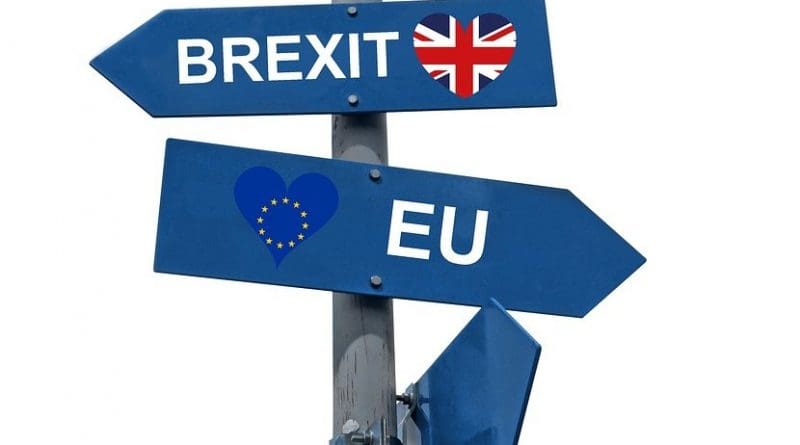UK’s Brexit U-Turns Shift Focus To Mid-March Votes – OpEd
By Arab News
By Andrew Hammond*
Theresa May on Tuesday made one of her biggest Brexit U-turns so far, bringing significant new uncertainty to the process of the UK leaving the EU. Having said about 80 times over the last two years that the country will definitely leave the EU on March 29, the prime minister has now opened up the option of extending the Article 50 process until at least the end of June, in what could yet become a major turning point in the Brexit debate.
With May under growing pressure from MPs and Cabinet ministers to give concessions, she asserted that, if her Brexit withdrawal deal is voted down again in the next meaningful vote on or before March 12, MPs will be allowed two further options. Firstly, they will be given a say on whether to support leaving the EU with “no deal,” which would mean that London will automatically leave on March 29 without many, if not all, of the rules that regulate the UK’s relationships with the EU; or they could vote to extend the Article 50 process.
These developments are potentially significant as they came only a day after opposition leader Jeremy Corbyn moved more strongly toward supporting a further Brexit referendum if May does not adopt the Labour Party’s softer Brexit stance, which includes a customs union agreement with the EU.
Unless Brussels unexpectedly offers more concessions to May on the so-called Irish backstop before March 12, or Brexiteer MPs and the Democratic Unionist Party cave into the prime minister, it now seems most likely that MPs will still not back her withdrawal deal in the first half of March. In this scenario, MPs will therefore need to decide whether to accept leaving without a deal and, if that fails, an Article 50 extension.
There is growing momentum in Parliament against a no-deal scenario, and it is therefore most likely this option will get voted down, barring a big change in sentiment — but that cannot be taken for granted. If the no-deal option is rejected by Parliament, this would raise the prospect of MPs potentially voting to extend Article 50. Should the EU-27 unanimously grant this request, a key question is how long this extension would be for. One possibility is London will ask for, or be granted, only a very short technical extension of potentially a month or less.
However, if London sought and obtained an extension to Article 50 that went beyond July 2 — the first day the new European Parliament meets — UK politicians would have to take part in that legislature’s elections in May (unless an exception is made). It is for this reason, and the complications this would bring, that the PM said on Tuesday that she does not countenance extending Article 50 beyond the end of June.
Of course, there is also a possibility that Parliament could reject both no-deal and an extension of Article 50. In this scenario, the European Council’s summit on March 21-22 would become the most likely Brexit withdrawal endgame moment. It is perhaps only then that the EU-27 will offer up any further concessions to London around the Irish backstop. By any standards, kicking the can down the road to late March would be brinkmanship diplomacy of the highest order.
However, in circumstances where the outcome of EU-UK talks is still not clear by March’s summit, there are at least three main outcomes, other than the continued possibility of a further Brexit referendum and/or general election. First is the prospect of a no-deal exit (unless the UK Parliament has sought to take this off the table earlier in the month), which both sides are now ramping up preparations for, given the chaos that could ensue.
A second possibility, especially should May get final concessions from the EU-27 on March 21-22, will be expediting votes from March 23 through both the House of Commons and the Lords. While primary legislation of this sort can be rushed through quickly in principle, the government cannot rule out a significant number of amendments being tabled that could still make the currently scheduled March 29 departure date unattainable.
The withdrawal deal would also need to be ratified by the European Parliament. Here, a Strasbourg meeting of Members of the European Parliament from March 25-28 would probably be the last chance for them to vote through the deal, leaving EU ambassadors only hours to potentially rubber-stamp the agreement.
Given how close to the wire this would be, it is also possible that May could ask, in the last week of March, for a last-gasp extension of Article 50. Should the EU-27 grant this, both the Commons and Lords must also vote to allow the currently legally binding exit date of March 29 to be changed.
Taken together, after the UK’s latest bout of Brexit drama, the withdrawal endgame is unlikely to come before mid-March at the earliest. However, if the UK Parliament cannot make up its mind by then over May’s deal, no deal, and an Article 50 extension, attention will turn to March 21 and 22, which, so late in the day, could see a frenzied last week of political brinkmanship.
- Andrew Hammond is an Associate at LSE IDEAS at the London School of Economics

